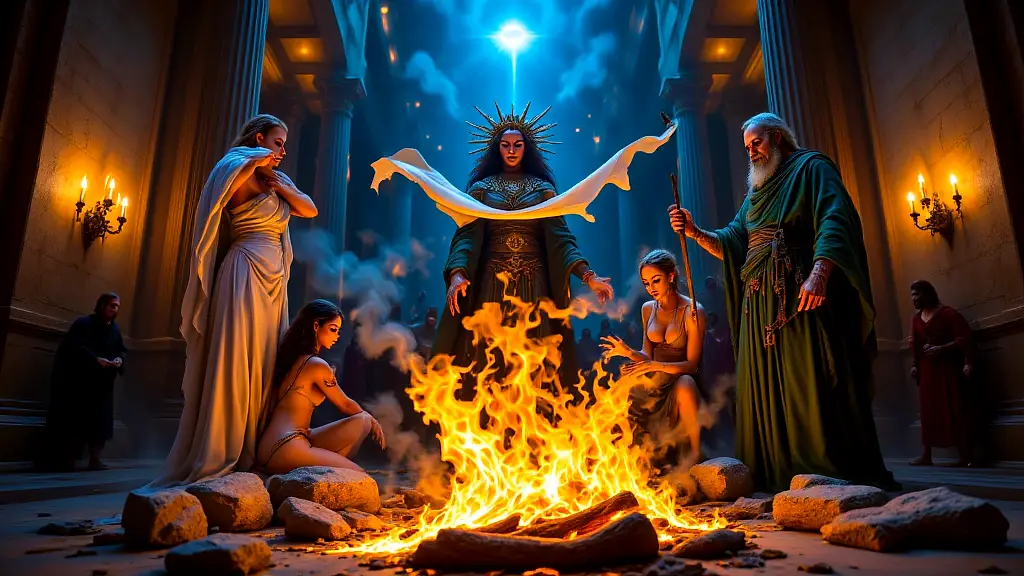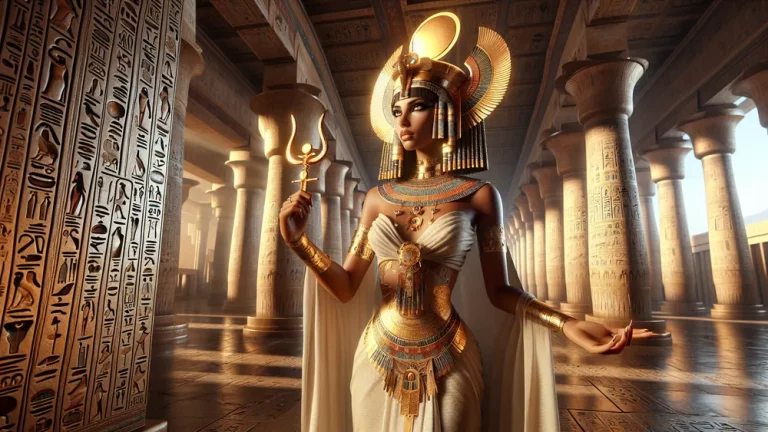Althaea In Greek Mythology: The Story Of Meleager’s Mother
In Greek mythology, Althaea was a tragic queen whose story involves a divine prophecy, maternal love, and unchangeable revenge. As the mother of Meleager, her fateful decision to burn a magical log tied to his life shows how destiny and sacrifice are linked, much like Achilles’ heel or the Norse Norns’ prophecies. Writers like Apollodorus and Ovid describe her as both a caring parent and a vengeful sister.
Key Points:
- Althaea was a queen in Greek myths who had to choose between saving her son Meleager or avenging her brothers.
- When Meleager was born, the Fates said he would live only as long as a certain log stayed unburned, so Althaea hid it.
- After Meleager killed her brothers in a fight over a boar hunt prize, Althaea burned the log, causing his death.
- The story means fate can’t be avoided, no matter how hard someone tries.
- Some versions say Althaea turned into a guinea fowl out of grief, while others say she killed herself.
- Her story is like other Greek myths where mothers face impossible choices with terrible results.
- Ancient writers like Ovid and Apollodorus told her tale, each adding different details.
She had to choose between protecting her son or avenging her brothers, who died during the Calydonian Boar Hunt. Her story reflects the Greek idea of moira (fate), where even gods had to obey the Fates. Later, we’ll explore her royal family, the chaos of the boar hunt, and how her actions affected other myths about tragic mothers.
Althaea Greek Mythology: Overview and Key Facts
| Category | Details | Sources and Notes |
|---|---|---|
| Lineage | Daughter of Thestius, king of Aetolia, and Eurythemis, who came from the Pleiades. Sister to Leda (mother of Helen of Troy) and Hypermnestra. | Apollodorus, Bibliotheca 1.7.10; Hesiod, Catalogue of Women (fragments). |
| Spouse/Children | Married Oeneus, king of Calydon. Mother of Meleager (the hero of the Calydonian Boar Hunt), Deianira (who later married Heracles), Toxeus, and Thyreus. | Homer, Iliad 9.543; Hyginus, Fabulae 171. |
| Divine Ties | Connected to Artemis because Oeneus ignored her rituals. Also tied to Dionysus through Oeneus’ wine cult. Some stories say she spoke directly to the Fates. | Bacchylides, Ode 5; Ovid, Metamorphoses 8. |
| Prophecy | The Fates said Meleager would live only while a log burned. Althaea hid it, but burned it after he killed her brothers. | Apollodorus 1.8.2; variations exist in Sophocles’ lost Meleager. |
| Major Conflict | She had to choose – avenge her brothers (killed by Meleager in the boar hunt) or save her son. Burning the log killed him, and she later took her own life. | Euripides’ Meleager (fragments); Ovid, Metamorphoses 8.445–525. |
| Aftermath | Some say grief turned Althaea and her sisters into guinea fowl (Meleagrides). Others claim she hanged herself. | Antoninus Liberalis, Metamorphoses 2; Ovid’s version differs. |
| Symbolism | The log stands for moira (fate). It was unchangeable, but humans still tried to control it. Fire represents destruction but also cleansing in rituals. | Compared to Achilles‘ heel (where Thetis tried to avoid fate). |
| Cultural Role | A tragic example of honor (timē) clashing with a mother’s love. Later writers used her story to explore revenge and the gods’ anger. | Homer, Odyssey 11.325 (Meleager’s ghost mentions her). |
Althaea’s Background
Althaea came from royal blood and had ties to gods. Her family’s important history played a key role in her tragedy.
Her Family and Royal Ties
Althaea came from royal blood and had godly ancestors – an important part of Greek heroic family trees. She was daughter of Thestius, king of Aetolia, and Eurythemis, who came from the ocean nymph Pleione. This mix of human and divine interested Greek myth-tellers. Her sister Leda was mother of Helen of Troy, showing how powerful her family was. Her marriage to Oeneus, king of Calydon, wasn’t just political.
It also joined two important royal families of ancient Greece.
Key members of Althaea’s immediate family:
- Parents: Thestius (mortal king) and Eurythemis (with godly ancestors)
- Sisters: Leda (mother of Helen and Clytemnestra) and Hypermnestra (stories differ)
- Spouse: Oeneus, ruler of Calydon (who was later linked to Dionysus)
- Children: Meleager (the doomed hero), Deianira (who married Heracles), plus Toxeus and Thyreus (less mentioned in myths)
These connections mattered because, in Greek culture, royal blood brought duties. She had to protect family honor, make strong alliances, and sometimes face impossible choices. Her father’s line gave her rights to Aetolia’s throne, while her mother’s Pleiades ancestry tied her to star myths sailors followed. This double heritage would later force her to choose between her son and her brothers when they fought.

Althaea’s royal and divine family ties led to impossible choices between her son and brothers when they clashed.
Althaea: The Queen Who Spoke to Gods
Althaea’s power went beyond politics to include the gods. She was both queen of Calydon and a go-between for humans and divine beings. Ancient texts show she oversaw important religious ceremonies for Artemis (whose anger later started the Calydonian Boar Hunt) and Dionysus (through her husband’s wine cult).
This wasn’t just for show – she kept the gods happy through gifts and rituals. Some stories suggest the Fates even spoke directly to her about her son’s fate. As both a political and religious leader, Althaea performed sacrifices, read signs from the gods, and possibly received prophecies. This was Althaea’s job – to keep peace with gods who changed their minds often.
Her family’s safety depended on these religious ceremonies working right. When she got warnings about her son from the Fates, it showed how closely she was tied to the divine world.
The Fateful Prediction About Meleager
Althaea’s special link to the world of gods brought her bad news. It made her choose between loving her son and accepting the fate that couldn’t be changed.
The Fates and the Mysterious Log
When the Moirai – the three goddesses who controlled fate – came at Meleager’s birth, they gave a prediction that troubled Althaea forever. Apollodorus wrote that Clotho, Lachesis and Atropos said the baby would live only while the hearth log kept burning.
This was direct, physical magic, showing the clear link between the log and his life that appeared in Greek fate stories. The hearth log was one example of these important magical objects tied to people’s lives. Others included Achilles’ heel and the Norse fylgja spirit. What made Althaea different was how she tried to trick fate by saving the log from the fire.
She kept it hidden like a dangerous treasure.

| Fate-Bound Figure | Binding Object | Parental Action | Outcome |
|---|---|---|---|
| Meleager | Hearth log | Hidden by Althaea | Temporary safety |
| Achilles | Heel (Styx dip) | Thetis’ protection | One weak spot |
| Norns’ Victim (Norse) | Carved runes | None recorded | Unavoidable fate |
Hearths were holy places in Greek homes, which represented family safety and life’s fragility. The Fates choosing a burning log as Meleager’s life-token mattered deeply. Fire stood for both cleansing and ruin in Greek thought.
Different stories disagree about how many Fates came, but all agree on the main point: while the log lasted, so would Meleager – until fate took what it was owed.
Althaea’s Bargain with Fate
Afraid for her son’s life, Althaea made a dangerous decision. She grabbed the burning log from the hearth and put out the flames, thinking she could cheat fate. Ancient texts say she wrapped the burned wood in fine cloth and locked it in a chest, treating it like a holy object.
This was more than belief – it was a queen’s attempt to bend the rules of fate. Greek stories show that fate can’t be avoided forever, only postponed. By saving the log, Althaea created a lasting danger for her family. Her protection became an impossible choice. When she later wanted revenge for her brothers’ deaths, that hidden log became both her tool and her punishment.
The log she had saved so carefully finally did what the Fates had decided long ago. In Greek beliefs, not even a mother’s love could change their first decision. What she saved to protect her son would one day destroy him.
The Calydonian Boar Disaster
Althaea’s effort to change her son’s fate would soon become less important than the gods’ anger, which would push her family to the limit. The gods would soon collect what they were owed.
When Artemis Got Angry
King Oeneus made a serious error with terrible consequences when he forgot Artemis in his yearly harvest offerings. This was more than rude – it was a serious insult to the gods. Artemis responded with an angry goddess’s wrath and sent a giant boar with large, curved tusks and burning red eyes. Its sharp bristles could stab through armor.
The beast’s breath ruined crops as it crushed them, destroying Calydon’s farmland quickly. This wasn’t a normal animal but a living weapon from the gods that showed Artemis’ two roles – guarding animals and causing sudden death. The boar focused its cruel precision on the vineyards, which were both Oeneus’ income and his king’s reputation.
Each vine it uprooted and ox it killed proved that even kings must respect the gods. Divine punishment came to those who ignored this rule.

Meleager’s Fight with His Uncles
The Calydonian Boar Hunt became famous for more than just the beast they hunted. Meleager led a group of Greece’s best warriors and finally killed Artemis’ monster, with Atalanta drawing first blood. This would cause a violent disagreement. Meleager gave the valuable boar hide to Atalanta instead of his uncles, possibly because he liked her and followed the hunt’s rules.
This mattered more than just a prize. In their society that valued respect, public recognition was extremely important. Meleager’s uncles, Thestius’ sons, angrily objected because they felt insulted. They tried to take the hide by force from Atalanta, saying a woman shouldn’t receive such honor. The fight quickly got worse. Meleager made his final decision and killed his own uncles to defend Atalanta’s rightful claim.
This family killing would affect many people later, showing how Greek myths often turned victories into tragedies.
The hunt included several famous warriors:
- Atalanta: The expert hunter who wounded the boar first
- Peleus: Who would later father Achilles
- Telamon: Father of Ajax
- Nestor: The future wise king of Pylos
- Theseus: The Athenian hero (some stories say he was there)
These witnesses spread the story across Greece, ensuring people remembered Meleager’s choice and its terrible consequences.
Meleager killed his uncles after they tried to take Atalanta’s prize, turning the hunt’s success into a family tragedy.
Althaea’s Vengeance and Meleager’s End
When her brothers died, it made Althaea furious and forced her to make the most difficult decision of her life. The protected log she had kept safe would now be used for its awful purpose.
The Tragic Burning of the Log
When Althaea learned Meleager killed her brothers, she had to decide between two terrible options – save her son or get revenge. Records show she stood by the fireplace where she kept the fateful log for years, choosing between loving her son and following the Greek blood vengeance laws. The flames touched the wood that had kept Meleager alive since he was a baby.
In that moment, Althaea became the one who fulfilled the prophecy, changing from a caring mother to someone carrying out fate.
The burning log had important meaning in Greek culture:
- Hearth: Normally for family, now used against family
- Fire: Could clean but also destroy
- Ash: What remained after fate happened
- Smoke: Rose up to the gods
Ovid’s Metamorphoses says the log burned fast in a quick fire that matched Meleager’s strong personality. When the last flame went out, Meleager fell dead on the battlefield far away, as if the fire had been inside him all along.
Transformation and Never-Ending Guilt
After burning the log, Althaea felt full of never-ending guilt. In Ovid’s version of the story, the gods turned her into a guinea fowl, a bird Greeks linked with constant sadness. This was more than punishment – it showed her eternal regret in physical form. The guinea fowl’s restless behavior matched Althaea’s feelings.
These birds moved nervously, made loud alarm calls, and never settled, just as Althaea couldn’t escape her guilt. Earlier Greek stories say she killed herself, but Ovid’s changed version gave her poetic justice by making her become what she already was – a creature showing choices she couldn’t undo.

With speckled feathers and sharp cries, the guinea fowl became a living sign of Althaea’s divine punishment, forever displaying the cost of her decision.
Althaea’s Place in Greek Myths
Althaea’s difficult story was important in Greek mythology, becoming one of many tragic characters because they challenged fate. People compared her story to other unfortunate mothers and those who dared to oppose destiny.
Tragic Mothers and Impossible Choices
Greek mythology often put mothers in terrible choices where every decision led to disaster. Being forced to choose between saving a child and following family duties created a difficult situation that connected Althaea to other mothers like Jocasta and Procne. These myths show what Greeks thought about mother’s love – powerful but dangerous, with women often controlled by gods and society’s rules.
The table below shows how these stories compare:
| Mother Figure | Source Myth | Conflict Type | Divine Involvement | Outcome |
|---|---|---|---|---|
| Althaea | Meleager myth | Brothers vs. Son | Fates’ prophecy | Killed son, became bird |
| Jocasta | Oedipus story | Incest vs. mother’s love | Apollo’s oracle | Suicide, kingdom fell |
| Procne | Tereus myth | Sister vs. mother | Madness from Dionysus | Killed son, became bird |
| Niobe | Various stories | Pride vs. gods’ honor | Artemis/Apollo anger | Turned to stone, always wept |
Each story follows the same pattern: mothers try to protect but end in permanent tragedy, with gods teaching hard lessons about pride and fate. The transformations into birds or stone that reminded people forever about breaking nature’s rules.
Stories About Althaea in Ancient Texts
Althaea’s story shows up in many ancient sources, with each one including different details. The oldest version we have is from Bacchylides in the 5th century BCE, which describes what happened after the hunt. Apollodorus wrote the most complete collection of myths about the prophecy concerning the log.
Ovid later greatly added details about the change into a bird, while fragments from Euripides show different versions of why Althaea acted as she did.
Here are the main sources:
- Bacchylides’ Ode 5 (476 BCE): First written account about the hunt’s results
- Euripides’ Meleager (c. 450 BCE, fragments): May have shown her thinking on stage
- Apollodorus’ Bibliotheca (1st-2nd c. CE): Full story about the log prophecy
- Ovid’s Metamorphoses (8 CE): Contains detailed emotions about the transformation
- Homer’s Iliad (9.529-599): Short mention proving Meleager was a hero
Different ancient writers told Althaea’s story in their own ways, with Bacchylides giving the earliest version and others like Apollodorus and Ovid adding more details later.
FAQs
1. Why did Althaea prioritize avenging her brothers over saving Meleager?
Althaea prioritized avenging her brothers because ancient Greek honor (timē) demanded loyalty to siblings as fiercely as to one’s children.
2. How does Deianira’s story intersect with Althaea’s tragedy?
Deianira’s story intersects with Althaea’s tragedy through their shared fatal choices – Deianira’s poisoned robe and Althaea’s burning of the log – both leading to irreversible familial destruction.
3. What rituals honored Althaea in Calydon?
The rituals honored Althaea in Calydon likely included hero-cult libations and votive offerings to appease her vengeful spirit.
4. Did Meleager’s soul receive afterlife justice?
Meleager’s soul in the afterlife remained unavenged, as Homer’s Odyssey portrays him eternally grieving among the shades.







